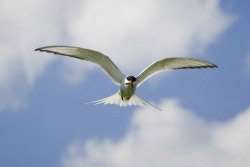Nature network hope for birds threatened by climate change

(Phys.org) —New research led by the British Trust for Ornithology and involving a University of York academic provides strong evidence that internationally important British bird populations are being affected by climate change, which could threaten their long-term conservation status.
The existing network of special sites, the nature reserves that are protected and managed for these species, will continue to be important for many of the same species in the future.
Published in Nature Climate Change, the research involved a team of scientists from around Europe, including Professor Chris Thomas, of the Department of Biology at York. They examined the impact of climate change on breeding seabirds, such as Puffins and gulls, and wintering waterbirds, such as ducks and wading birds, at sites across the UK that are internationally designated as 'Special Protection Areas' (SPAs).
The researchers found that while these species are being affected by climate change, the UK SPA network will continue to provide an important refuge for them.
The research found that climate change can explain more than half of the observed 30-year population trends of the 62 species studied, which included many species found in internationally important numbers in the UK. Based on this information, future projections under a scenario of 4˚C of mean global warming would be likely to cause more than half of these species' populations in the UK to decrease by more than 25 per cent.
Climate change is a long-term threat to some northern breeding seabirds, with large declines projected for Arctic Terns and Guillemots, and to waterbirds which overwinter on our estuaries in large numbers, such as Eider and Bar-tailed Godwit. Some species like Avocet and Snipe, whose populations may be limited by cold winter weather, are anticipated to increase, alongside breeding Common Terns.
Importantly, although there may be some change in which of these bird species will be found in individual SPAs, the study projected that these sites will continue to hold internationally important bird populations in the future. The SPA network may not stop some species declining, but will provide an increasingly important refuge for our birds.
Dr Ali Johnston of the British Trust for Ornithology, and the paper's lead author, said "Here we show that many recent changes to UK bird populations have been driven by climate and that these impacts are set to continue into the future, leading to some large population declines for several species. However, there is also a positive message; we found that the measures we already have in place to conserve our seabirds and waterbirds are 'future-proofed' for a changing climate, and will also protect important populations in the future".
Professor Thomas added: "Our research shows that birds have already responded to climate change by changing their geographic distributions. This could be a problem if the climate causes rare species to move out of the Nature Reserves that were established to protect them. However, although rare birds may decline in some reserves, in many cases they will increase in others. It turns out that almost all of our existing reserves will continue to be important, even if they protect somewhat different species in future."
More information: The full project report, technical annexes and a policy summary can be found here: randd.defra.gov.uk/Default.asp … ed=2&ProjectID=16731
Journal information: Nature Climate Change
Provided by University of York

















